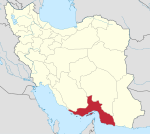Kukherdharang

Kukherdharang Persian: كوخردهرنگ | |
|---|---|
City | |
| Coordinates: 27°05′49″N 54°28′12″E / 27.09694°N 54.47000°E[1] | |
| Country | Iran |
| Province | Hormozgan |
| County | Bastak |
| District | Kukherdharang |
| Population (2016)[2] | |
| • Total | 4,390 |
| Time zone | UTC+3:30 (IRST) |
Kukherdharang (Persian: کوخردهرنگ)[a] is a city in, and the capital of Kukherdharang District of Bastak County, Hormozgan province, Iran. It is also the administrative center for Kukherd Rural District.[5] Kukherd was traditionally part of the region of Larestan. Kukherd's inhabitants are Larestani people.[6]
History and etymology
[edit]Kukherd civilization is ancient, going back more than 2,000 years. Evidence of the ancient archeology includes monuments that have been found dating to the Sassanid dynasty. This is in addition to having old tombs and having its unique architecture like the Windcatcher Bâdgir بادگیر Kukherd in Persian consists originally of two old Persian words: “koy كوي” and “kherd”. خرد In the لغت نامه Loghatnaameh Dictionary [1], “koy” means alive and "kherd" means reason which can be translated to "The land of reason".
Demographics
[edit]Population
[edit]At the time of the 2006 National Census, the population (as the village of Kukherd in Kukherd Rural District) was 3,144 people in 637 households.[7] The following census in 2011 counted 3,839 people in 1,023 households.[8] The 2016 census measured the population of the village as 4,390 people in 1,196 households. It was the most populous village in its rural district.[2]
After the census, the village of Kukherd, following its merger with the village of Harang, was transformed into a city and named Kukherdharang.[3]
Historical sites
[edit]Among ancient monuments that have been found in Kukherd are:
- Terenah:, (terenah ترنه ) the unique ancient methods of ancient Kukherd population have been using to transfer the sweet water from Mehran salty river to the other bank of the river order to water their lands
- The Castle of Siba which has been maintained until 1163–1192. It was destroyed by an earthquake in Kukherd city, and was affected by the flood in 1367, which destroyed the remainder of the castle.
- Another monument is for the bazar of Siba.
- The Castle of Aamaj.
- The Castle of Tawseelah in Geri zamerdan valey.
- The Historic Bath of Siba – An ancient bath house that is believed dated back to the Sassanid dynasty.[9]
- Islamic Monuments: Qiblah Mosque : مسجد جامع قبلة this mosque goes back to the ninth hijra century
Kukherd in the Cambridge History of Iran
[edit]An early reference to Kukherd is dated to 1649, this is found in the Cambridge History of Iran,[10] Volume 6th:
Went north from Kung through Kuhkird, Bastak and Nimar, where it joined the main route at Lar, From the lesser Ports at Bandar Rig and Bandar Rishahr routes converged near Burazgan and the road to Shiraz Passed through Dalaki, Kazarun and the Dasht_i Arjan, These routes Were subject to extraordinary variations in climatic conditions, scorching heat when only traveling at night was bearable and Perishing cold when travel might be impossible, An English factor, Robert Loftus, noted in April 1628, I stayed in Digerdoo” Dihgirdu” six daies until….
See also
[edit]Notes
[edit]References
[edit]- ^ OpenStreetMap contributors (4 October 2023). "Kukherdharang, Bastak County" (Map). OpenStreetMap (in Persian). Retrieved 4 October 2023.
- ^ a b "Census of the Islamic Republic of Iran, 1395 (2016)". AMAR (in Persian). The Statistical Center of Iran. p. 22. Archived from the original (Excel) on 5 May 2022. Retrieved 19 December 2022.
- ^ a b Rahimi, Mohammad Reza (25 November 2013). "Distributional changes in Bastak County, one of the functions of Hormozgan province". Qavanin (in Persian). Ministry of Interior, Political and Defense Commission. Archived from the original on 6 September 2023. Retrieved 6 September 2023.
- ^ Kukherdharang can be found at GEOnet Names Server, at this link, by opening the Advanced Search box, entering "-3072394" in the "Unique Feature Id" form, and clicking on "Search Database".
- ^ Aref, Mohammad Reza. "Divisional changes and reforms in Hormozgan province". Islamic Parliament Research Center (in Persian). Ministry of Interior, Political-Defense Commission of the Government Board. Archived from the original on 2 December 2015. Retrieved 10 February 2024.
- ^ Potter, Lawrence G.; Sick, Gary G., eds. (2002). Security in the Persian Gulf: Origins, Obstacles, and the Search for Consensus. Palgrave Macmillan. pp. 27–29. ISBN 9780312239503.
- ^ "Census of the Islamic Republic of Iran, 1385 (2006)". AMAR (in Persian). The Statistical Center of Iran. p. 22. Archived from the original (Excel) on 20 September 2011. Retrieved 25 September 2022.
- ^ "Census of the Islamic Republic of Iran, 1390 (2011)". Syracuse University (in Persian). The Statistical Center of Iran. p. 22. Archived from the original (Excel) on 17 January 2023. Retrieved 19 December 2022.
- ^ الكوخردى ، محمد ، بن يوسف، (كُوخِرد حَاضِرَة اِسلامِيةَ عَلي ضِفافِ نَهر مِهران) الطبعة الثالثة ،دبى: سنة 199۷ للميلاد Mohammed Kookherdi (1997) Kookherd, an Islamic civil at Mehran river, third edition: Dubai
- ^ Peter Jackson and Lawrence Lockhart (Ed) (1986), Vol. 6th, The Cambridge History of Iran: Cambridge University Press
External links
[edit]

